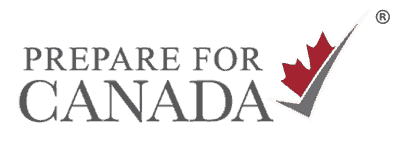
Thinking about searching for a medical radiation technologist (MRT) job in Canada? Like many other healthcare professionals, MRTs are in demand because the healthcare industry is experiencing shortages. So, if you want to continue your career in Canada, continue reading! You’ll learn about medical radiation technologist job requirements, salaries, career options, job search techniques, and more!
To work as a medical radiation technologist, employers usually require that you have completed a two- to three-year college or other approved program in diagnostic or magnetic resonance imaging (for radiological technologists and magnetic resonance technologists), nuclear medicine technology, or radiation therapy. Or, you must have completed a Bachelor of Health Sciences in radiography, nuclear medicine, or radiation therapy along with a period of supervised practical training.
Advertisement:
In addition, licensing is required by a regulatory body in some provinces. However, membership with a provincial association is required by other provinces. Medical radiation technologists must be certified by the Canadian Association of Medical Radiation Technologists in all provinces except Quebec and British Columbia.
Jump to:
- How to Immigrate to Canada as a Medical Radiation Technologist
- What to Expect When Pursuing a Medical Radiation Technologist Career in Canada
- Requirements to Become a Medical Radiation Technologist in Canada
- Upgrading Your Skills to Meet MRT Job Requirements
- Bridging Programs for Medical Radiation Technologist Careers in Canada
- Medical Radiation Technologist Schools in Canada
- Medical Radiation Technology Associations in Canada
- How Much Do Medical Radiation Technologists Make in Canada?
- Best Provinces to Work in Canada as a Medical Radiation Technologist Based on Salary & Lifestyle
- Pursuing a Medical Radiation Technologist Career in Canada
- How to Find Your First Medical Radiation Technologist Job in Canada
- Volunteering
- MRT Internships
- Mentoring
- Networking Can Help Your Job Search and MRT Career
- MRT Job Shadowing
- Job Search Techniques for Medical Radiation Technologists in Canada
- Immigrant Settlement Agencies
- Resume Writing for Medical Radiation Technologist Jobs
- Interview Techniques for Medical Radiation Technologist Jobs
How to Immigrate to Canada as a Medical Radiation Technologist
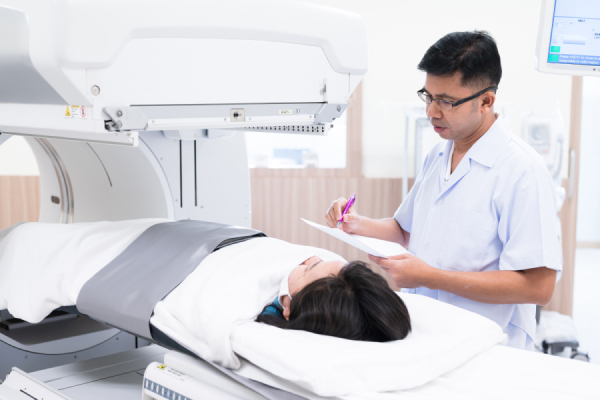
Advertisement:
It’s important to research medical radiation technologist job requirements before you move to Canada. This will make it easier to continue your career when you arrive. In fact, there are some steps that you can take before you arrive that will help you to find a job faster. There are steps that you can take before you immigrate to improve your chances of practicing your profession in Canada.
Before You Move to Canada to Pursue a Medical Radiation Technologist Career
- Attend the free webinar What to Know About the Canadian Job Market to get a sense of the Canadian labour market.
- Contact the Canadian Association of Medical Radiation Technologists to learn about the:
- Process to follow
- Cost and time required to obtain a license
- Steps in the licensing process that you can take before and after you move to Canada.
- Contact the provincial regulatory body in the province where you plan to settle to determine:
- International qualifications that they recognize
- Language requirements
- Documents required for employment or to continue your education in Canada. Verify if the documents need to be translated and if you have to use a professional translation service in Canada.
- Assess your language skills by taking an online self-assessment on the Centre for Canadian Language Benchmarks website.
- Improve your language skills, enroll in language classes while you are in your home country, and continue when you arrive in Canada. You need to have strong English or French (depending on your destination province) language skills and you may be tested.
- Gather and organize your official education, work, and identity documents while still in your home country.
- Research medical radiation technologist salaries in different cities (wages may vary across Canada).
- Understand how the medical radiation technology profession is practiced in Canada. Familiarize yourself with the procedures, laws, and legislation that govern the profession in the province where you will settle.
- Know example job titles that are used in Canada for medical radiation technologists.
What to Expect When Pursuing a Medical Radiation Technologist Career in Canada
Medical radiation technologists require a license to work in the provinces of Alberta, New Brunswick, Nova Scotia, Ontario, Quebec, and Saskatchewan. So, you need to register with the relevant provincial authority to practice and use the professional designation.
Membership with a provincial association is required in the provinces of Newfoundland and Labrador, Prince Edward Island, Manitoba, and Northwest Territories.
The Canadian Association of Medical Radiation Technologists (CAMRT) is the national professional association and certifying body. CAMRT represents four disciplines:
- Radiological technology
- Magnetic resonance
- Nuclear medicine
- Radiation therapy.
To help internationally educated medical radiation technologists work in Canada, CAMRT provides online tools and resources to assess your credentials and help you prepare for exams.
Advertisement:
Employment Outlook for Medical Radiation Technologist Jobs in Canada
Job prospects for medical radiation technologists are good for the next few years. With the healthcare system experiencing a significant shortage of workers, there is a great opportunity for internationally trained professionals to continue their MRT careers in Canada. Depending on your location and qualifications, both full-time and part-time opportunities are available.
Researching Medical Radiation Technologist Jobs in Canada
It’s smart to research your profession before you arrive in Canada. And, a good place to start researching job requirements is with the National Occupational Code (NOC) 32121 (NOC 2021 Version 1.0). The NOC provides a standard definition of the role of medical radiation technologists, along with example titles, main duties, and job requirements. This information will also help you when you begin your job search in Canada.
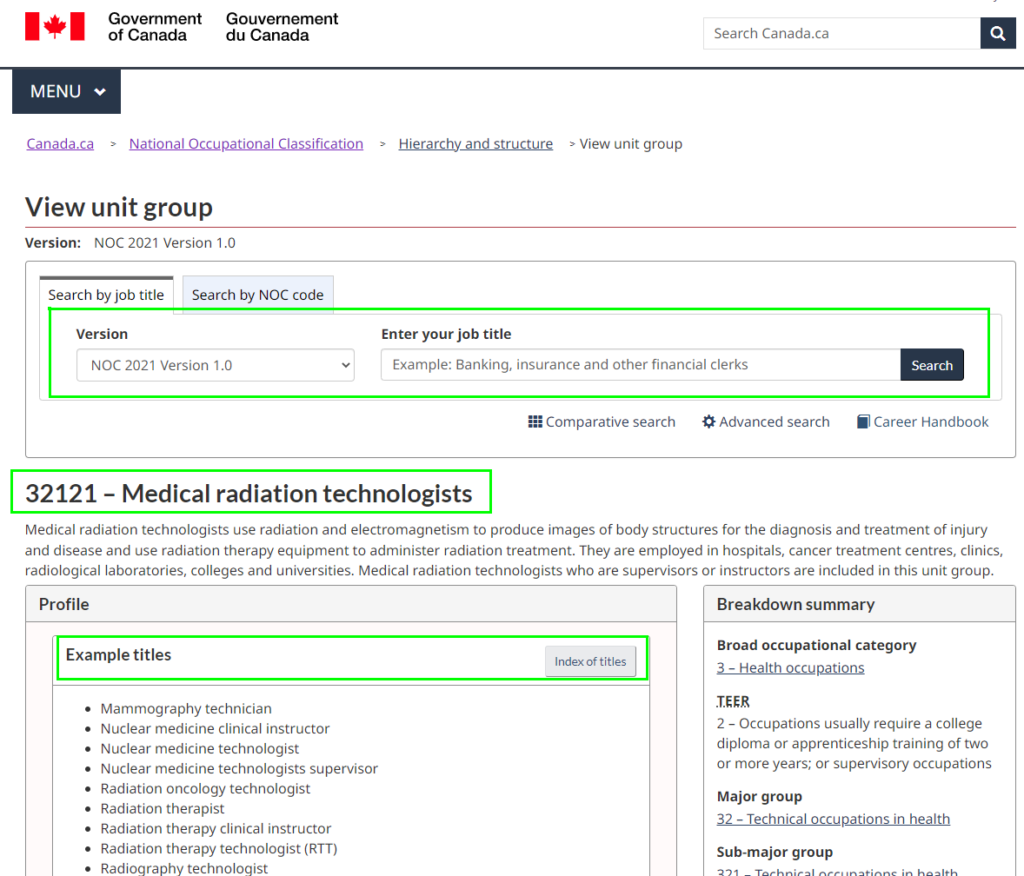
Requirements to Become a Medical Radiation Technologist in Canada
Internationally trained medical radiation technologists must meet the licensing requirements in Canada to practice. International graduates must take part in a credential recognition process. Some can benefit from bridging programs offered by local colleges and universities.
Below we explain the steps you will need to take to work as a Medical Radiation Technologist in Canada.
Credential Recognition to Meet MRT Job Requirements in Canada
Credential recognition is the process of verifying and assessing your skills, competencies, and international credentials fairly and rigorously. The best way to learn about the credential recognition process is to contact the provincial or territorial regulatory body where you plan to settle. They can advise you about the documents that you require, licensing fees, and more. It’s a good idea to take this step before you arrive in Canada and then decide the date that you will depart for Canada.
Depending on the province you intend to settle in, your licensing process may include:
- Exams (eligibility, program selection, qualifying, certification)
- Language proficiency tests
- Credentialing
- Postgraduate training/assessment
- Return-of-service agreements (commitment to practice in an underserved community for an agreed period of time).
When you know the licensure procedure and understand what the MRT regulatory body expects, you can carefully complete your application. The licensure process has many stages and can seem complicated. And you’ll also require a significant financial and personal commitment to pursue the process. Preparing financially for this reality is important.
Related Post:
How Do Education Evaluation and Credential Recognition Differ? (Infographic)
Credential Assessment Services
If you plan to enrol in a college or university program in Canada, you may require an education evaluation. Contact the school that you plan to attend to find out what’s required and if there is a specific credential assessment agency that you should use to verify your international education.
Here are some resources you can consult:
World Education Services (WES) – Ontario
International Qualifications Assessment Service (IQAS) – Alberta
The International Credential Evaluation Service (ICES) – British Columbia
To find more organizations and agencies providing credential evaluation, assessment and qualification recognition services click here.
Upgrading Your Skills to Meet MRT Job Requirements

Skills Upgrading to Qualify for Medical Radiation Technologist Jobs in Canada
Canadian employers put a high emphasis on soft skills. These are the personal attributes that enhance your interactions, job performance, and medical radiation technologist career prospects. Unlike your hard skills such as technical, analysis, and science skills, you can apply your soft skills broadly.
Soft skills like good communication, collaboration, and interpersonal skills are important for medical radiation technologists. As a medical radiation technologist, you must be sensitive to the patient’s physical and psychological needs and have the necessary technical skills. If your hard skills get you an interview, most likely it’s your soft skills that will help you get the job and succeed in the role.
Though not a must, upgrading your education and skills through a bridging program or other educational courses can be an important part of your journey to work as an MRT in Canada. You will constantly face changing technology and varied demands from patients, employers, the government, and the general public. Therefore, it’s vital to commit to lifelong learning to demonstrate professional growth.
Language Training for Medical Radiation Technologists in Canada
You may have strong technical skills, but you may need to upgrade your communication skills. Strong skills in one or both of Canada’s official languages, English or French – are important for your future in Canada. Whether you choose to focus on learning or improving English or French will depend on which of the two languages most people speak in the area where you intend to live.
You may be eligible for Language Instruction for Newcomers to Canada (LINC) program. Otherwise, you can find free or affordable classes in English as a Second Language (ESL) or French as a Second Language (FSL) classes through school boards or settlement agencies.
There are even language courses to teach you professional terminologies, such as job-specific language training and Occupation Specific Language Training (OSLT) in Ontario. And, if you already speak one of Canada’s two official languages at a high level, learning the other one is a good option, as it may offer you better job opportunities.
Bridging Programs for Medical Radiation Technologist Careers in Canada
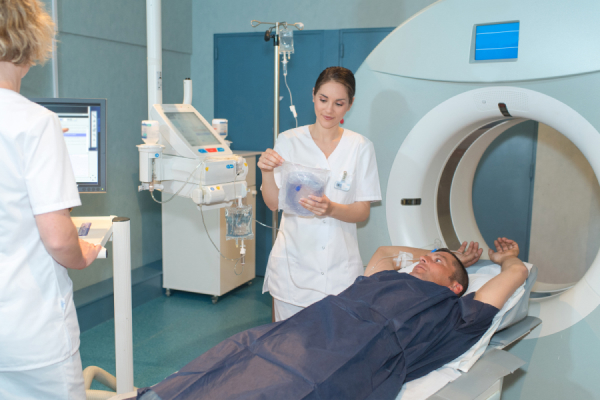
Bridging programs can help you to transition more quickly into the Canadian labour market. They help to “bridge” your international experience and training to the Canadian workplace. Many colleges, universities, and immigrant-serving agencies offer bridging programs that you may be eligible for. The following programs may be suitable for you:
Michener Institute – Toronto
Access & Options for Internationally Educated Health Professionals
The program assists foreign-trained qualified health professionals in certification and registration within Canada. An individualized program will be developed to prepare internationally trained medical radiation technologists to write the CAMRT certification examination.
Northern Alberta Institute of Technology (NAIT) – Edmonton
Medical Radiological Technology Bridging
The program provides tools to assess and enhance the practical readiness of internationally educated medical radiological (x-ray) technologists for the Alberta workplace.
Medical Radiation Technologist Schools in Canada
Continuing your education after you arrive in Canada can also boost your career options. Medical radiation technology programs are offered at the college and university level in schools across Canada. There are over 20 colleges and universities that offer medical radiation technology programs including:
Alberta
Northern Alberta Institute of Technology
Southern Alberta Institute of Technology
British Columbia
Anderson College of Health, Business and Technology
British Columbia Institute of Technology
Camosun College
College of New Caledonia
Manitoba
Red River College Polytechnic
New Brunswick
Collège communautaire du Nouveau-Brunswick
Horizon Health Network (University of New Brunswick Saint John)
Newfoundland
College of the North Atlantic
Nova Scotia
Dalhousie University
Ontario
Algonquin College of Applied Arts and Technology
Cambrian College
Collège Boréal
Confederation College
Fanshawe College of Applied Arts & Technology
Mohawk College-McMaster University
The Michener Institute of Education at UHN
Prince Edward Island
UPEI School of Radiography
Saskatchewan
Saskatchewan Polytechnic
For a complete list of accredited and registered health education programs, visit Accreditation Canada.
Medical Radiation Technology Associations in Canada
The following associations provide information about licensure and certification and offer professional development, education, and networking opportunities.
National Medical Radiation Technology Associations
Canadian Association of Medical Radiation Technologists (CAMRT)
MRT Provincial Regulatory Bodies for
Alberta
Alberta College of Medical Diagnostic & Therapeutic Technologists
British Columbia
New Brunswick
New Brunswick Association of Medical Radiation Technologists
Nova Scotia
Nova Scotia College of Medical Imaging and Radiation Therapy Professionals
Ontario
College of Medical Radiation Technologists of Ontario
Quebec
Saskatchewan
Saskatchewan Association of Medical Radiation Technologists
Manitoba
Manitoba Association of Medical Radiation Technologists
Ontario
Ontario Association of Medical Radiation Sciences
Prince Edward Island
College of Allied Health Professionals of Prince Edward Island
Immigrant Networks For Medical Radiation Technologists
Professional immigrant networks are organized, volunteer-run member-based associations or networks created by and for immigrant professionals that seek to:
- Create a forum to contribute to and enrich their respective communities
- Provide opportunities for their members to find meaningful employment and achieve their professional goals
The groups offer networking events, mentoring, information sessions, and professional development opportunities to help increase your employment opportunities. Here are a couple of resources to consider:
Nova Scotia
Immigrant Services Association of Nova Scotia (isans); helps newcomer professionals with their full economic and social integration in the province of Nova Scotia.
Ontario
Toronto Region Immigrant Employment Council (TRIEC): helps newcomers to expand their professional networks and understand the local labour market.
For more information about working in Canada, visit our Finding a Job in Canada page. We’ll help you to achieve your goals in Canada!
How Much Do Medical Radiation Technologists Make in Canada?
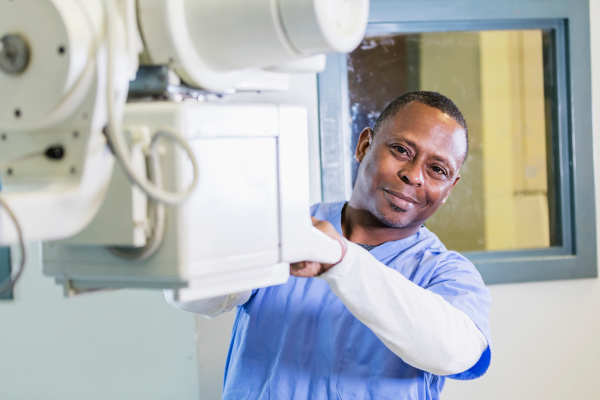
According to the Government of Canada Job Bank, Medical radiation technologist salaries fall between $25 to $50 per hour. The national average hourly medical radiation technology salary is $36.22 per hour.
To give you an example, if you worked a full-time role and worked 40 hours per week you could make between $52,000 and $104,000 per year. How much you make is dependent on where you live, your skills, experience, areas of specialization and if you work full-time or part-time.
Medical Radiation Technologist Salary in Canada
Medical radiation technologist salaries differ based on where you live. Here are the most recent Medical Radiation Technologist salary numbers in Canada as of 2022:
| Province | Low ($/hour) | Median ($/hour) | High ($/hour) |
|---|---|---|---|
| Canada | 25.00 | 36.22 | 46.15 |
| Alberta | 35.00 | 44.00 | 54.66 |
| British Columbia | 32.00 | 40.50 | 43.00 |
| Manitoba | 30.82 | 36.21 | 44.00 |
| New Brunswick | 30.82 | 32.61 | 43.00 |
| Newfoundland and Labrador | 30.71 | 34.00 | 46.00 |
| Northwest Territories | N/A | N/A | N/A |
| Nova Scotia | 29.50 | 33.50 | 45.00 |
| Nunavut | N/A | N/A | N/A |
| Ontario | 32.00 | 40.00 | 47.34 |
| Prince Edward Island | 27.00 | 36.10 | 46.00 |
| Quebec | 23.00 | 31.00 | 37.42 |
| Saskatchewan | 33.91 | 38.00 | 46.41 |
| Yukon | N/A | N/A | N/A |
Best Provinces to Work in Canada as a Medical Radiation Technologist Based on Salary & Lifestyle
Job prospects for MRTs depend on where they work in Canada. So, it’s helpful to research job prospects across Canada. Labour shortage conditions in healthcare are expected to persist from 2019 – 2028. And as Canada’s population ages, there will be greater demand for health services.
Job prospects are considered good in almost all provinces. To research job prospects by province, click here. Within each province, larger cities typically offer the best opportunities because there are larger healthcare networks, more hospitals, and a greater demand for MRTs.
Pursuing a Medical Radiation Technologist Career in Canada
To work as a medical radiation technologist in Canada you will follow a similar path as many other healthcare careers. You need to have the right academic credentials, relevant work experience, and a plan for where you want to work within the country. Below is valuable information to help you pursue a medical radiation technologist career in Canada:
Major Employers for MRT Jobs in Canada
In Canada, medical radiation technologists are employed in hospitals, private clinics, cancer centres, research laboratories, industry, education, and administration. Hospitals and clinics employ MRTs in the specialties of magnetic resonance and radiography. Major clinics, cancer centres, and hospitals in large urban centres employ medical radiation technologists in the specialties of radiation therapy and nuclear medicine. Very few medical radiation technologists are self-employed.
Many medical radiation technology professionals work full time, with a forty-hour work week including weekend, evening, and standby work. However, some do work part-time, as there is a growing number of part-time, casual, and contract employment positions available.
For information on jobs for medical radiation technologists in Canada, see the CAMRT, where you will find a “job bank.” You may find information about available jobs on provincial organizations’ websites.
You can also visit Canada’s Best Diversity Employers website to search for hospitals and other healthcare settings where you may be interested in working. This designation recognizes employers with exceptional workplace diversity and inclusion programs.
How to Find Your First Medical Radiation Technologist Job in Canada
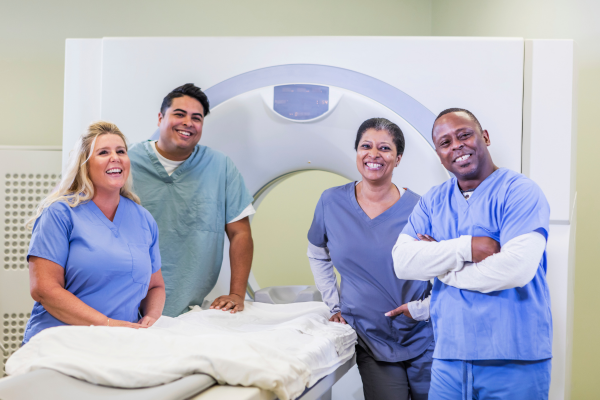
Canadian employers may not know how to assess your international education and work experience or prefer you to have experience working in Canada. Lack of local market experience can pose a challenge for newcomers, but there are ways to overcome some of these challenges.
When an employer tells you that you have no “Canadian experience” often they mean that they’re not sure if you will fit into their workplace. They are not sure that you are familiar with Canadian codes and standards of practice or that you have the communication skills or interpersonal savvy to be an asset to their organization. Employers want professionals who possess the skills that will allow them to fit right in and over time become leaders.
You can overcome this barrier and acquire an understanding of Canadian workplaces by volunteering, networking, finding a mentor, and even job shadowing. This experience may even help you to get a higher medical radiation technologist salary.
Volunteering
Volunteering is an important part of Canadian society and lifestyle. It can help you settle in faster, make friends, practice communication skills, or learn new technical skills. In some cases, it may even lead to a job at the organization where you are volunteering. You can find volunteer opportunities in non-profit organizations and community centres where you can use your knowledge and expertise. Look for opportunities in the health sector, technical work, lab work, or other jobs involving contact with people. You can even use your volunteer work to help you gain “Canadian experience” and add it to your medical radiation technologist resume.
To learn about opportunities, you can contact Volunteer Canada or other community organizations in your area. As well, you can ask your relatives, friends, or colleagues about volunteer opportunities that match your skills and interests.
MRT Internships
Another good way to acquire Canadian experience is with an internship. Career Edge is an innovative internship program that allows you to apply for paid internships at Canada’s leading private, public, or non-profit sector employers. The program regularly posts internship opportunities and offers paid internships of four, six, nine, or 12 months for recent immigrants who:
- Are fluent in English
- Have a Bachelor’s level education (at least)
- Have a minimum of three years of international work experience.
Career Edge is a not-for-profit social enterprise that has managed over 9,200 paid internships across Canada since 1996.
Mentoring

A mentor is someone who can coach or mentor you and share information about working in your profession in Canada. It’s helpful to find someone such as a practicing medical radiation technologist or with a background in healthcare, who can help you navigate the Canadian work environment.
Many professional associations or firms offer this type of “buddy” program, where a seasoned member guides a junior one. Contact the relevant associations in your area to learn about mentorship opportunities.
As well, many bridging programs and immigrant-serving agencies have mentorship programs where they match a newcomer with someone in their professional field. The Mentoring Partnership brings together recent skilled immigrants and established professionals in occupation-specific mentoring relationships. The program is managed by the Toronto Region Immigrant Employment Council.
Informational Interviews for Medical Radiation Technologist Jobs
An informational interview is a brief (20–30-minute) meeting that you schedule with a person who is currently working in your field.
You should not try to get a job during an informational interview but rather find out more about the profession in Canada. For example, you may want to learn more about industry trends, and regulatory, or technological changes that are affecting the field.
An informational interview with a contact from your network can be an excellent source of medical radiation technologist career information. In addition to getting information about the industry, you can benefit from their first-hand experiences working in the field in Canada.
Networking Can Help Your Job Search and MRT Career

An essential activity to help you discover job leads, gain information about a particular firm or industry, and meet others in your field is networking. As many job vacancies are not advertised, networking with others can help you to discover available jobs in this “hidden job market”. These jobs also offer very competitive medical radiation technologist salaries and benefits.
Networking is really about meeting people, building relationships, and sharing information. Ideal places to network include conferences and professional associations.
LinkedIn is also helpful for networking.is another important professional tool for networking. It is great for reconnecting with your ex-colleagues and employers, searching by company or jobs, and getting introductions and recommendations. You can also join some related professional groups. But remember, you have to allow time to cultivate and grow the ties you establish through networking.
MRT Job Shadowing
Not exactly a mentorship or a volunteer opportunity, job shadowing is an interesting way to learn about the industry in Canada and make professional contacts. Job shadowing can last anywhere from an hour to an entire day, and it’s a great way to learn and understand the Canadian workplace.
As in volunteering, identify 5-10 companies or organizations you wish to work for and try to use your network to approach medical radiation technologists – or other employees in a healthcare role – who work there. Contact them, explain that you are a newcomer, and ask if it’s possible to job shadow them for some time to get familiar with the work culture.
Job Search Techniques for Medical Radiation Technologists in Canada
While there is a demand for medical radiation technologists in Canada, the job market is competitive. So, you need to prepare yourself to succeed in the job search. You must look for jobs in the region where you will settle and take time to develop a plan to find work. There are many ways to search for jobs within the healthcare field. Consider these tips to gain employment:
- Broaden your search and include alternative medical radiation technologist careers and sectors.
- Seek out a mentor in the healthcare profession that could give you valuable insight and advice and introduce you to their professional network.
- Join job-finding or networking groups through settlement agencies.
- Attend industry job fairs and regularly online job boards.
- Check the CAMRT job bank for available jobs as well as the provincial regulatory bodies.
Immigrant Settlement Agencies
Finding a job in Canada may be very different than in your home country. Most settlement agencies and other immigrant-serving organizations can help you to find job vacancies, update your resume, write cover letters, prepare for interviews, and understand what Canadian employers are looking for.
To find immigrant services in your area, click here.
Resume Writing for Medical Radiation Technologist Jobs
Your resume must showcase your technical excellence, proficiency, and accomplishments as a medical radiation technologist.
To show that you are the best candidate for the job, your resume should highlight how your abilities and skills contributed to your accomplishments.
Here are some additional tips to consider when writing your medical radiation technologist resume:
- Create a professional resume format using medical resume templates available online.
- Identify your experience working with specialized radiation therapy equipment and performing diagnostic procedures and your related accomplishments
- Highlight your understanding of the required safety measures to provide effective services, and specify your knowledge of advanced technological developments in the field.
- List skills, qualifications, and specialized training that you have received.
Related Posts:
Cover Letter Format that Employers Notice
Interview Techniques for Medical Radiation Technologist Jobs
While the future looks bright for medical radiation technologists in Canada, you need to prepare well for your job interview.
Prior to your job interview, review your qualifications for the medical radiation technologist position so you can speak to your qualifications with confidence. Assess your experience to determine how you can contribute high value to the position. And, finally, prepare responses to some questions that a hiring manager may ask you.
Here are some questions to consider:
What are your strengths?
Don’t be shy. Identify three to five key strengths that directly relate to the position such as your organizational skills, collaboration skills, and leadership skills.
Describe a time when you had to manage multiple priorities. How did you manage your time?
This is the time to demonstrate your organizational and time management skills.
Describe how you keep your MRT skills and knowledge up to date.
The hiring manager wants to know that you actively pursue continuous learning. You can discuss a recent conference that you attended, professional journals that you regularly read, or specific training that you have or will receive.
During the interview, you will also have to respond to standard technical questions as well.
While you can never know exactly what to expect in an interview, research and being well-prepared can make all the difference.
With a positive outlook for Medical Radiation Technologist jobs in Canada, and an understanding of job requirements, careers, salaries, and job search techniques, now is the time to start building your plan!
Interested in learning more about working in Canada? Check out our Finding a Job in Canada resource page. We can help you achieve your career goals in Canada.
